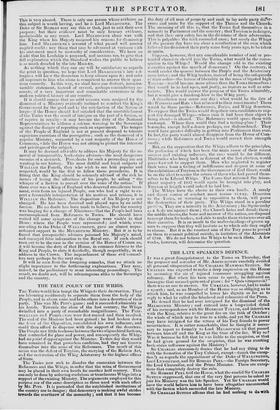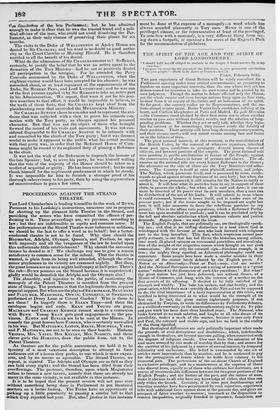THE LATE SPEAKER'S DEFENCE.
Jr was a great disappointment to the Tories on Thursday, that the proposer and seconder of Mr. ABERCROMBY carefully avoided all personal vituperation of Sir CHARLES MANNERS SUTTON. sir CHARLES was expected to make a deep impression on the House by assuming the air of injured innocence struggling against calumny. But when his turn came to speak, he delivered an harangue that seemed quite out of place ; for " Quis vituperavit?" there was no one to answer. Sir CHARLES, however,had to make a speech ; and, as no Member of the House was so obliging as to attack him, be was compelled to lower his dignity so far as to reply to what he called the falsehood and calumnies of the Press. He denied that he had ever intrigued for the dismissal of the MELBOURNE Ministry; and entered into a longwinded detail of his correspondence with Sir HERBERT TAYLOR, and interviews with the King, relative to the great lire on the 16th of October ; the whole of which may be true to a tittle, and yet Sir CHARLES may have intrigued for the return of his Tory friends to power nevertheless. It is rather remarkable, that he thought it neces- sary to report so formally to Lord MELBOURNE all that passed between himself and the King at the time of the fire. Why so? Was it because he felt that he was liable to the suspicion, or that he had given ground for the suspicion, that he was exerting back-stairs influence against the Ministry? Sir CHARLES strenuously denies that be had any thing to do with the formation of the Tory Cabinet, except—(mark the excep- tion !) as regards the appointment of the Duke of WELLINGTON, Lord I.YenniURST, and Sir ROBERT PEEL—the Foreign Secretary, the Lord Chancellor, and the Prime Minister. These are excep- tions that completely destroy the rule. Sir ROBERT PEEL told time House, what the candid Sir CHARLES ; Surma. suppressed, that one of the very first persons he asked to Join his Ministry was the late Speaker. Yet Sir CHARLES would • have the world believe him to have been altogether unconnected with the faction which succeeded the late Ministry. Sir CHARLES Surros affirms that he had nothing to do With ti.ra Alas()/Wien of the Sate Parlialatmt; but he has admitted enough Ao make it clear that he was the trusted friend and a poli- tical adviser of the men, who could not avoid dissolving the Par- liament, as their only chance of preserving their places for six Inaenths. 'he visits to the Duke of WELLINGTON at Apsley House are ienied by Sir CRAitt:Es.; and his word is no doubt as good autho- rity as the Court Circular or Morning Herald. He is therefore entitled to all the benefit of his denial. What do the admissions of Sir CHARLES amount to? Sufficient, certainly, to justify the belief that he was an active agent in the formation of the Tory Ministry—had be not so positively denied all participation in the intrigue. For he attended the Privy Councils ournmoned by the Duke of WELLINGTON, when the slightest excuse would have been accepted for his absence; he was consulted about, or at least cognizant of, the appointments of the Duke, Sir ROBERT PEEL, and Lord LYNDHURST; and he was one of the first persons applied to by Sir ROBERT to take an active part in his Administration. We repeat, that were it not for his posi- tive assertion to that effect, it would be impossible to believe, in the teeth of these facts, that Sir CHARLES kept aloof from the placebunting crew that succeeded the MELBOURNE Ministry. Sir CHARLES SUTTON chose to consider and to represent the evi- dence that was collected with a view to prove his intimate con- nexion with the Tory party, as charges against his personal character. But that was not the object of those who brought forward the record of his visits and movements. It was not con- sidered disgraceful to Sir CHARLES SUTTON to be intimate with and consulted by the chiefs of the Tory party ; but it was deemed useful to make it apparent to the public what his actual position with that party was, in order that the Reformed House of Com- mons might be roused to its neglected duty of placing a Reformer in the chair.
It was not the wish of the Reformers to impeach the honour of the late Speaker; but, to serve his party, he was himself willing that the vote of the majority of the House should be taken as a verdict of acquittal or guilty. He has been convicted ; but he may thank himself for the unpleasant predicament in which he stands. It was impossible for him to furnish a stronger proof of his thorough subserviency to his party, than by using the argumentum ad misericordiam to gain a few votes.

























 Previous page
Previous page